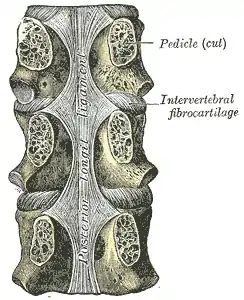| Ossification of the posterior longitudinal ligament | |
|---|---|
 | |
| Posterior longitudinal ligament (running vertically in the center) in the thoracic region. | |
| Specialty | Rheumatology |
Ossification of the posterior longitudinal ligament (OPLL) is a process of fibrosis, calcification, and ossification of the posterior longitudinal ligament of the spine, that may involve the spinal dura.[1] Once considered a disorder unique to people of Asian heritage, it is now recognized as an uncommon disorder in a variety of patients with myelopathy.[2]
Causes
Genetic and environmental factors appear to play a role in pathogenesis.[2][1] Dr James Hong, lecturer at the University of Toronto with a special focus in cervical spinal myelopathy, states that sitting still for too long contributes to OPLL. OPLL may also be associated with diffuse idiopathic skeletal hyperostosis[3][4]
Diagnosis
Myeolography, including post-myelographic CT is likely the most effective imaging study an accurate diagnosis.[1]
Treatment
Surgical management options include extensive cervical laminectomy with or without an additional posterior arthrodesis, anterior decompression and arthrodesis, and posterior cervical laminoplasty.[3] Treatment decisions can be made based on a grading systems devised by Hirabayashi et al.,[5] supplemented by the Nurick myelopathy classification system.[6]
Prognosis
Most patients suffer from only mild symptoms.[1] Symptoms typically last approximately 13 months.[1] Of patients without myelopathy at initial presentation, only 29% of them will develop myelopathy within 30 years.[7]
Epidemiology
The age range of patients with OPLL is from 32 to 81 years (mean = 53), with a male predominance.[1][8] Prevalence is higher in those of Japanese or Asian ancestry (2–3.5%) [9] and rarer in other racial groups (0.16%).[10] Schizophrenia patients in Japan may have as high as 20% incidence.[11]
References
- 1 2 3 4 5 6 Greenberg, Mark (2006-01-01). Handbook of neurosurgery. Thieme. ISBN 978-1588904577. OCLC 474019573.
- 1 2 Belanger, Theodore (2005). "Ossification of the Posterior Longitudinal Ligament". Journal of Bone and Joint Surgery. 87 (3): 610–615. doi:10.2106/JBJS.C.01711. PMID 15741630.
- 1 2 Belanger, T. A.; Rowe, D. E. (2001-07-01). "Diffuse idiopathic skeletal hyperostosis: musculoskeletal manifestations". The Journal of the American Academy of Orthopaedic Surgeons. 9 (4): 258–267. doi:10.5435/00124635-200107000-00006. ISSN 1067-151X. PMID 11476536. S2CID 265656.
- ↑ Meyer, Paul (1999). "diffuse idiopathic skeletal hyperostosis in the cervical spine". Clinical Orthopaedics & Related Research. 359 (359): 49–57. doi:10.1097/00003086-199902000-00006. PMID 10078128.
- ↑ Hirabayashi, K.; Watanabe, K.; Wakano, K.; Suzuki, N.; Satomi, K.; Ishii, Y. (1983-10-01). "Expansive open-door laminoplasty for cervical spinal stenotic myelopathy". Spine. 8 (7): 693–699. doi:10.1097/00007632-198310000-00003. ISSN 0362-2436. PMID 6420895. S2CID 21825972.
- ↑ NURJCK, S. (1972-01-01). "The Pathogenesis of the Spinal Cord Disorder Associated with Cervical Spondylosis". Brain. 95 (1): 87–100. doi:10.1093/brain/95.1.87. ISSN 0006-8950. PMID 5023093.
- ↑ Matsunaga, Shunji; Sakou, Takashi; Taketomi, Eiji; Komiya, Setsuro (2004-03-01). "Clinical course of patients with ossification of the posterior longitudinal ligament: a minimum 10-year cohort study". Journal of Neurosurgery: Spine. 100 (3): 245–248. doi:10.3171/spi.2004.100.3.0245. ISSN 1547-5654. PMID 15029912.
- ↑ Choi, Byung-Wan; Song, Kyung-Jin; Chang, Han (2011). "Ossification of the Posterior Longitudinal Ligament: A Review of Literature". Asian Spine Journal. 5 (4): 267–76. doi:10.4184/asj.2011.5.4.267. PMC 3230657. PMID 22164324.
- ↑ Tsuyama, N. (1984-04-01). "Ossification of the posterior longitudinal ligament of the spine". Clinical Orthopaedics and Related Research (184): 71–84. ISSN 0009-921X. PMID 6423334.
- ↑ Wang, Michael Y.; Thambuswamy, Michael (2011-03-01). "Ossification of the posterior longitudinal ligament in non-Asians: demographic, clinical, and radiographic findings in 43 patients". Neurosurgical Focus. 30 (3): E4. doi:10.3171/2010.12.FOCUS10277. ISSN 1092-0684. PMID 21434820. S2CID 20216810.
- ↑ Matsunaga, Shunji; Koga, Hiroaki; Kawabata, Naoya; Kawamura, Ichiro; Otusji, Masaki; Imakiire, Takanori; Komiya, Setsuro (2008-06-01). "Ossification of the posterior longitudinal ligament in dizygotic twins with schizophrenia: a case report". Modern Rheumatology. 18 (3): 277–280. doi:10.3109/s10165-008-0036-1. ISSN 1439-7595. PMID 18306978. S2CID 33766083.